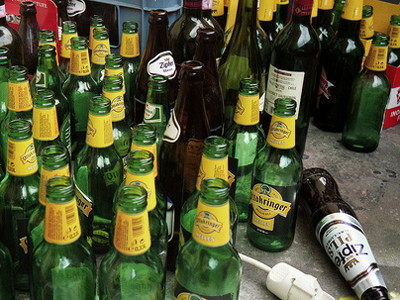Magic mushrooms shown may help treat alcoholism

Some mushrooms, called
Percentage of Heavy Drinking Days Following Psilocybin-Assisted Psychotherapy vs Placebo in the Treatment of Adult Patients With Alcohol Use Disorder: A Randomized Clinical Trial | Psychiatry and Behavioral Health | JAMA Psychiatry | JAMA Network
https://doi.org/10.1001/jamapsychiatry.2022.2096
Psychedelic drug therapy may help treat alcohol | EurekAlert!
https://www.eurekalert.org/news-releases/962598
'Magic mushroom' psychedelic could treat alcohol addiction, trial finds | Live Science
https://www.livescience.com/magic-mushroom-psilocybin-alcohol-use-trial
According to the American Center for Disease Control and Prevention (CDC), excessive drinking and liver disease associated with alcoholism kills 95,000 Americans annually, resulting in enormous economic losses, personal injury, and cognitive decline. has also been associated with mental disorders. Treatments for alcoholism include psychological counseling, supervised detoxification programs, and medications to reduce cravings for alcohol.
Newly, a team led by researchers at the New York University Grossman School of Medicine in the United States conducted a clinical trial to see if psilocybin, the active ingredient of magic mushrooms, is effective in treating alcoholism. The idea of using psychedelic drugs to treat alcoholism has existed for a long time, and clinical trials using the hallucinogen LSD were conducted in the 1960s and 1970s. In early clinical trials, it was confirmed that LSD was effective in reducing alcohol consumption, but it seems that political pressure has stopped research on treatments using psychedelic drugs.

The clinical trial recruited 93 alcoholics between the ages of 25 and 65, of whom 48 were assigned to an experimental group receiving psilocybin, and the remaining 45 received a placebo containing the weakly psychoactive
Two treatment sessions were conducted 4 weeks apart, with subjects in the experimental group receiving 25 mg psilocybin per 70 kg body weight in the first treatment, and the dose was increased in the second treatment depending on the efficacy of the first treatment. . A control group was similarly medicated with a placebo and a total of 12 psychotherapy sessions were provided for both groups. After that, the subjects reported the percentage of days they drank heavily, and provided samples of hair and nails to confirm that the report was correct.
As a result of the experiment, it was found that the amount of drinking decreased in both groups during the 32-week test period, but the decrease was significantly greater in the experimental group that received psilocybin. Specifically, the proportion of days with heavy drinking was reduced by 51% in the control group, but by 83% in the experimental group. In addition, in a survey eight months after the first administration, it was reported that 24% of the control group succeeded in abstinence, while 48% of the experimental group succeeded in abstinence. In addition, all subjects were provided with an ``opportunity to receive a third dose of psilocybin,'' and subjects who received a placebo were also given the opportunity to be treated with psilocybin.
``I stopped drinking shortly after my first dose of psilocybin,'' said Jon Kostas, one of the participants. It definitely made an impact on my life and I can say it saved my life.'

Mild side effects such as headache, nausea, anxiety, and short-term trips were more common in psilocybin-treated subjects than in the experimental group, but suicidal ideation and severe vomiting occurred while drinking outside of treatment sessions. All serious adverse events such as these occurred in the control group. 'We did not detect any significant safety issues associated with psilocybin,' said Michael Bogenschutz, director of the Langone Center for Psychedelic Medicine at New York University and lead author of the paper, although psilocybin is associated with blood pressure. He also pointed out that it is important to take it only under careful supervision, due to its increased heart rate and psychoactive effects.
In addition, this clinical trial was conducted as a double-blind study in which neither the subjects nor the medical staff knew the allocation of each group. However, due to the difference in the effects that appeared after drug administration, more than 90% of the subjects and medical staff were able to guess which drug was administered. Bogenschutz acknowledges that the lack of suitable placebos has been a challenge in conducting research on psychedelic drugs.
At the time of writing, it is unknown what mechanism psilocybin helps treat alcoholism. However, increasing connectivity between brain networks by activating serotonin 2A receptors in the brain may enhance the effects of psychotherapy sessions.
Bogenschutz argued that the effect of treating alcoholism with psilocybin was greater than that reported for existing drugs, and it was noteworthy that the effect persisted months after treatment. 'If these effects are maintained in future trials, psilocybin could be a breakthrough in the treatment of alcohol use disorders,' he said. The research team plans to conduct a large-scale clinical trial in 2023, and the trial at 15 sites is expected to take two to three years to complete.

Related Posts:







